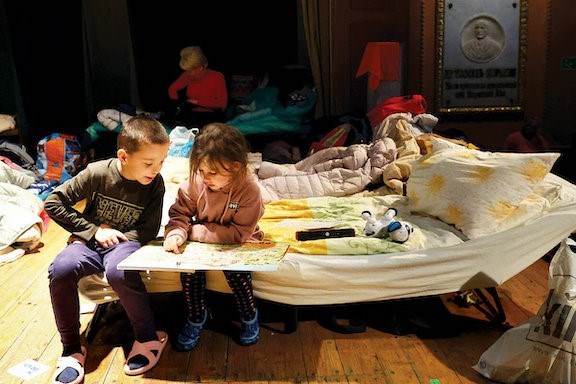REPRINTED WITH PERMISSION FROM THE CHRISTIAN SCIENCE MONITOR
 Refugee children read a book as they rest inside the theater hall of Dom Ukrainski W Przemyslu (Ukrainian House), transformed into temporary accommodation for people fleeing the Russian invasion of Ukraine, in Przemysl, Poland, March 18, 2022.Fabrizio Bensch/Reuters
Refugee children read a book as they rest inside the theater hall of Dom Ukrainski W Przemyslu (Ukrainian House), transformed into temporary accommodation for people fleeing the Russian invasion of Ukraine, in Przemysl, Poland, March 18, 2022.Fabrizio Bensch/Reuters
April 1, 2022
When you think about the basic needs of Ukrainian refugee children, books would seem to occupy a place much farther down the list than food, clothing, and shelter. But for Maria Deskur, CEO of Poland’s Universal Reading Foundation, the idea of giving books to children is nearly as urgent.
“The help for kids here is crucial,” Ms. Deskur explains in a video chat from Warsaw. “Reading to a child creates a sense of safety, the feeling that ‘If we have time to read a book, that means we are OK,’” she says.
Her foundation aims to get as many Ukrainian-language books into the hands of refugees as possible. With 20,000 books still in transit out of Ukraine, her group has distributed about 30,000 printed by Polish publishers. Ms. Deskur would love to see the overall number rise to 200,000 or even 500,000 books, including those for teens and adults. The Universal Reading Foundation has so far raised $170,000 toward its goal.
The organization, whose purpose is to increase literacy rates in Poland, has another motive behind its efforts – encouraging reading as a civic good. At the end of World War II, Poland’s libraries and publishing industry lay in ruins.
“After 70 years, we are still behind the other societies where that didn’t happen,” Ms. Deskur says. “We have to help Ukraine so this doesn’t happen there.”
The challenge is vast. One million Ukrainian children have arrived in Poland and more are coming every day. The consequences of low literacy rates “are terrible. A society that reads is more open; it’s a society that can enter into a dialogue and understand each other better,” Ms. Deskur says.
This article appeared in the Monitor Daily on April 1, 2022.
Page created on 6/20/2022 10:14:48 PM
Last edited 6/20/2022 10:27:22 PM
